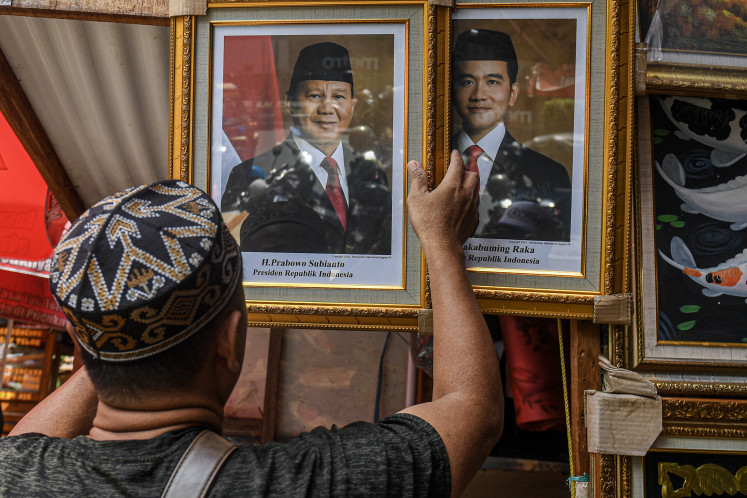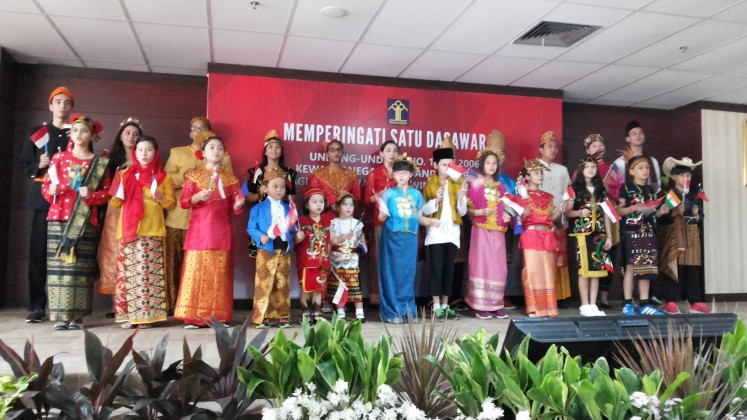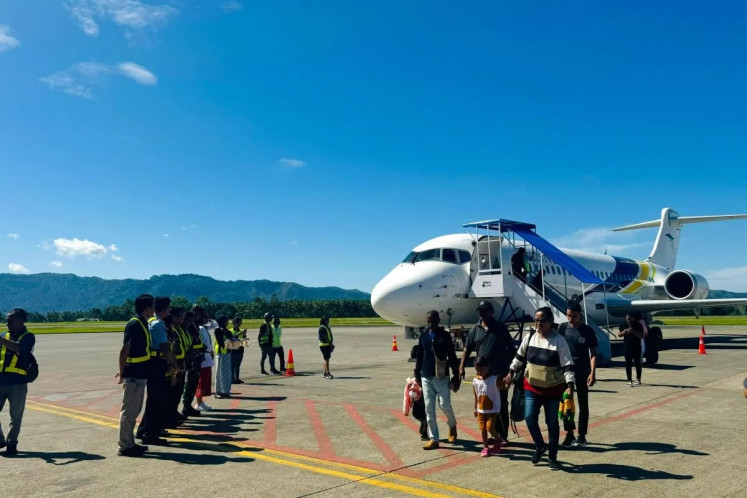The dilemma of liberal media
In an anecdotal perspective, many say that Indonesian media has been free since reformation
Change Size

I
n an anecdotal perspective, many say that Indonesian media has been free since reformation. Such a perspective is understandable given that Indonesia has passed two media regulations, i.e. Law No. 40/1999 on the press and Law No. 32/2002 on broadcasting, which guarantee freedom of the press.
However, if we look deeper, we will find tendencies that are against the principle of freedom of the press. Some indicators such as freedom of the press index, media ownership structure, press worker unions and journalist assassinations show that the state of media freedom in Indonesia is really troubling. The actual condition of media during elections also demonstrates degradation of media independence. How can such things happen in this democracy?
The Paris-based Reporters Without Borders (RSF) just launched the annual index of press freedom, in which Indonesia improved its rank from 146 out of 179 countries in 2012 to 139 out of 179 countries in 2013. Some criticize the organization as exaggerating the bad condition of press freedom by ignoring regulation quality and focusing too much on violence against journalists. However, Freedom House also puts Indonesia's status as only 'partly free'.
I can sense that both indexes make sense especially due to the growing number of violence against journalists in the last four years as shown by a survey under the Alliance of Independent Journalists (AJI) and the Press Legal Aid Institute (LBH Pers). Indonesia has also recorded nine cases of journalist assassinations without legal clarity since 1996, including the killing of Yogyakarta-based journalist Muhammad Syafruddin.
Other data shows that only 12 media corporations dominate the information stream in this big country. While capitalism encourages free and fair competition, the Indonesian media industry proves that oligarchy is the real condition. In a situation where media ownership is centralized, we can't find heterogeneous media content that supports a diversity of opinions. The media ownership oligarchy is also politically concerning as the owners tend to play in the political arena, as bluntly shown by some TV owners today.
Despite the high number of media outlets nationally, journalists are in a weak position. Research showed that in 2012 there were only 31 press worker unions, in which only one out of thousands of media outlets have signed a Common Labor Agreement. Journalists as supporters of freedom of expression themselves do not have freedom of association in their internal organization.
So what is improving under our so-called democratic system of media? The only aspect that has grown aggressively after 1999 is advertisement purchases. According to Adquest Millenium, advertisement purchases increase year-by-year from US$6 million in 1999 to $60 million in 2010 and $90 million in 2012. This figure shows the paradox of media in Indonesia, as though it has grown rapidly in economic terms, in journalistic ones it has foundered. The business goes on no matter how many journalists are killed and how free and independent media is. The political economy question then emerges. After escaping from the authoritarian regime in 1998, does economic power control media dynamics?
The general structural tendency in a post-authoritarian country is the shifting of domination from a state-based regime to an economic-based regime. The transformation of media structure in Indonesia is often interpreted in a democratic sense ' to escape from state authoritarianism ' without any consideration that economic forces may also become the new determinants of journalistic quality. The term 'liberalization' very rarely appears in general media advocacy discourse compared to 'freedom of the press', 'freedom of expression', or 'democratization'.
The term 'liberalization' doesn't only consider the political aspect of being liberal, but also accommodates economic drive. In short, liberalization doesn't only mean free from Soeharto but also carefully prepares economic drive on how to regulate it.
Indonesia is a good example of how improper anticipation of media liberalization in the end threatens media quality itself and democracy in general. In television, we see how ratings become the only ideology to produce programming. We also see the domination of private broadcasting, which marginalizes public and community broadcasting.
State bureaucracy is nothing more than an event organizer of such economic libido in media business. Robert McChesney wrote Rich Media, Poor Democracy to figure out how economic forces have changed media from the fourth estate to become the threat to democracy. My research in 2012 concluded that not only society was the victim of such a condition but also media workers.
Another example of the state's failure to regulate media democratically is media during elections. Instead of being independent, media, especially television, has become the extension and instrument of political and capital desire. The orientation of news production is political affiliation of TV to presidential candidates. This is due to the intersection of media owners and political leaders.
TV stations are segregated under political interests that downgrade their mandate of being independent. In this sense, we can see TVOne as pro Prabowo Subianto-Hatta Rajasa while Metro TV as pro Joko Widodo-Jusuf Kalla, only because their owners are political supporters of the two pairs.
This is really a big dilemma where being free from state control doesn't mean that media is free and independent at all levels. The absence of state control in immature democratic states means the opportunity for economic forces to become the new determinants of media. This is really frightening. Liberal doesn't mean the state is absent in shared life. The state should be able to regulate aspects of shared life, including media and economic drive, under democratic principles.
The writer is program manager of the Tifa Foundation, Jakarta, and author of Penumpang Gelap Demokrasi, Liberalisasi Media di Indonesia (The Dark Passenger of Democracy, the Liberalization of Media in Indonesia).









